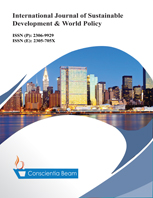Impact of Labour, Capital and Human Resources in Productivity of Transport Firms in Nigeria
Abstract
The extent of damage to the Transport Industry in Nigeria can not be overemphasized. These problems arose from the lack of critical and vital information concerning the extent of manpower development in the transport industry in Nigeria. In addition, information on the quantitative relationship between manpower developments, labour, and capital investment and the level of corresponding productivity are not readily available. Therefore there is need for extensive research on the relationship between human resource development, labour and the capital investment and related productivity in the Nigerian Transport industry. Therefore, the objective of this study is to ascertain the significant contributions of the above mentioned variables to the productivity of the transport industry as a whole. The Primary data sources comprised of direct questionnaires that were administered to the parastatals and transport firms of all modes of Transport (land, sea and air). Secondary data sources comprised of existing documents that have been published from various transport organisations. Data collected form the study were analysed using the regression analysis (Y=Bo +B₁X₁+B₂X₂+ԑ (v-u)) and the application of the frontier model can be influenced by human capital inputs was further applied to determine the extent to which productivity and efficiency of transport firms. From the results of the analysis it was discovered that majority of the workers in the transport industry were unskilled with only a few workers possessing higher degrees. Although, positive relationship was observed between the between human resource effect and the productivity and in conclusion it was seen that effects of productivity in transport firms in Nigeria depends largely on labour and capital inputs than on human resource effect.

